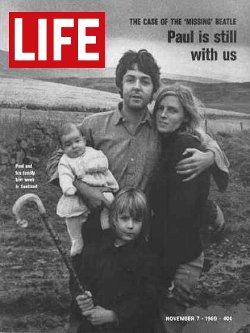Paul is dead
Paul is dead is an urban legend and conspiracy theory alleging that Paul McCartney of the Beatles died in 1966 and was secretly replaced by a look-alike. The theory began circulating in 1969, gaining traction among fans and the media.
Origins[edit | edit source]
The "Paul is dead" rumor started in October 1969, when a caller to Detroit radio station WKNR-FM told disc jockey Russ Gibb about the rumor and its clues. Gibb and other callers then discussed the rumor on air for the next hour, leading to widespread attention.
Clues[edit | edit source]
Proponents of the theory claim that clues to McCartney's death can be found among the lyrics and artwork of the Beatles' recordings. Some of the most frequently cited examples include:
- The cover of the album Abbey Road, which is said to symbolize a funeral procession.
- The song "A Day in the Life" from the album Sgt. Pepper's Lonely Hearts Club Band, which contains the lyrics "He blew his mind out in a car".
- The back cover of Sgt. Pepper's Lonely Hearts Club Band, where McCartney is the only Beatle facing backwards.
Debunking[edit | edit source]
Despite the popularity of the theory, it has been widely debunked. McCartney himself addressed the rumors in a 1969 interview with Life magazine, stating that he was very much alive. The Beatles' press office also issued statements denying the rumors.
Cultural Impact[edit | edit source]
The "Paul is dead" theory has had a lasting impact on popular culture. It has been referenced in various media, including films, television shows, and other music. The theory has also been the subject of academic studies on mass hysteria and the spread of rumors.
See also[edit | edit source]
References[edit | edit source]
External links[edit | edit source]
 This conspiracy theory related article is a stub. You can help WikiMD by expanding it.
This conspiracy theory related article is a stub. You can help WikiMD by expanding it.
Search WikiMD
Ad.Tired of being Overweight? Try W8MD's physician weight loss program.
Semaglutide (Ozempic / Wegovy and Tirzepatide (Mounjaro / Zepbound) available.
Advertise on WikiMD
|
WikiMD's Wellness Encyclopedia |
| Let Food Be Thy Medicine Medicine Thy Food - Hippocrates |
Translate this page: - East Asian
中文,
日本,
한국어,
South Asian
हिन्दी,
தமிழ்,
తెలుగు,
Urdu,
ಕನ್ನಡ,
Southeast Asian
Indonesian,
Vietnamese,
Thai,
မြန်မာဘာသာ,
বাংলা
European
español,
Deutsch,
français,
Greek,
português do Brasil,
polski,
română,
русский,
Nederlands,
norsk,
svenska,
suomi,
Italian
Middle Eastern & African
عربى,
Turkish,
Persian,
Hebrew,
Afrikaans,
isiZulu,
Kiswahili,
Other
Bulgarian,
Hungarian,
Czech,
Swedish,
മലയാളം,
मराठी,
ਪੰਜਾਬੀ,
ગુજરાતી,
Portuguese,
Ukrainian
Medical Disclaimer: WikiMD is not a substitute for professional medical advice. The information on WikiMD is provided as an information resource only, may be incorrect, outdated or misleading, and is not to be used or relied on for any diagnostic or treatment purposes. Please consult your health care provider before making any healthcare decisions or for guidance about a specific medical condition. WikiMD expressly disclaims responsibility, and shall have no liability, for any damages, loss, injury, or liability whatsoever suffered as a result of your reliance on the information contained in this site. By visiting this site you agree to the foregoing terms and conditions, which may from time to time be changed or supplemented by WikiMD. If you do not agree to the foregoing terms and conditions, you should not enter or use this site. See full disclaimer.
Credits:Most images are courtesy of Wikimedia commons, and templates, categories Wikipedia, licensed under CC BY SA or similar.
Contributors: Prab R. Tumpati, MD



